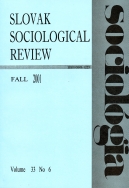Local Culture in Slovakia
Local Culture in Slovakia
Author(s): Simon SmithSubject(s): Cultural Essay, Political Essay, Societal Essay
Published by: Sociologický ústav - Slovenská akadémia vied
Keywords: Local culture; political reform; cultural education; local government Slovakia; Slovakia: Local culture under communism; The organisation of local culture in Slovakia today; Spontaneous (informal) cultural activities in Slovakia; The extent of local cultu
Summary/Abstract: Local Culture in Slovakia. Perceptions of local culture in Slovakia still owe much to a division between official and unofficial, formal and informal, or traditional and alternative spheres, a division imposed upon local culture in the communist era. A related distinction between organised and spontaneous ‘streams’ of local culture is retained in the initial descriptive part of this article (following a brief overview of the situation of local culture under communism) since many ‘old’ institutional forms continue into the present (and are therefore reflected in statistical categories), although their practical content has evolved. Another, largely self-contained ‘stream’, organised by Matica slovenská, is also considered at the outset, although it is omitted from the subsequent discussion and examples. The article then explores the post-1989 public debate on local culture, which has been dominated by a ‘revolutionary’ discourse emphasising concepts such as de-étatisation, decentralisation, pluralisation and a return to authenticity in cultural expression and organisation. This has been opposed by a ‘residualist’ discourse, which continues to stress the irreplaceable role of state agencies in guaranteeing the preservation of a traditional Slovak local culture. These discourses are examined in the context of the history of political reform affecting the organisation and financing of local culture. Following this the article analyses two critical transformation processes: the transformation of state cultural education institutions and the transformation of local public administration (local government). State institutions are faced with the challenge of adapting to the changing institutional-social-cultural environment, and, notwithstanding the presence of residual paternalistic attitudes, have often done so with some success. Local authorities are involved in a search for new types of relationship with the voluntary sector (including participants in local culture), the private sector and state agencies. With the decentralisation of competencies to local (and now regional) authorities, and also partly as a consequence of the ‘pro-democratic alliance’ with civil society groups during the era of the last Mečiar government, local self-government is increasingly seen as the natural embodiment of a community's identity, with a moral as well as practical responsibility for the development of local cultural life. Several examples demonstrate how local culture benefits from the interaction of these various actors in flexible partnerships, exploiting the specific skills each one brings. The examples also show the resilience of local culture, even under difficult social and economic conditions, wherever there exists a core of committed activists. Local culture - as the multifaceted expression of the ‘personality’ of a place - has a vital role to play in mobilising a community’s human potential, enabling communities to respond constructively to social transfor
Journal: Sociológia - Slovak Sociological Review
- Issue Year: 2001
- Issue No: 6
- Page Range: 569-592
- Page Count: 24
- Language: English

